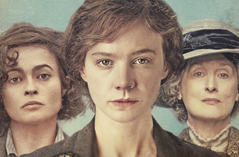
I saw the film, Suffragette, this week and was struck by the power of this moving chronicle of the women's movement in England at the turn of the twentieth century . It is so infrequent that we are given a glimpse into women's history. "Iron Jawed Angles" was a brilliant film made over a decade ago and it seemed everyone assumed that pretty much covered all we needed to know on women's history. We got the right to vote, what else was there?
What I am so choked up by is the knowledge and realization in a film like 'Suffragette" is not just the horrific and brutal fight that women went through for suffrage, and are still going through in some nations, but the realization, as portrayed in the film, that the right to vote is not just about the ability to participate in the political system, it is about the right to live as a free person. Women have historically been viewed as little more than indentured servants. The significant difference being that their debt was never paid and their free labor contract never ended.
Regardless of class, power over ones own affairs was always relegated to the male members of the family. Prior to marriage all possessions belonged to a father, brother or other male relative. Upon marriage, the husband assumed all control of property, money and personal liberties. This control even extended to the children that she birthed. They were considered the property of the husband, just as she was, and could be beaten, battered and even given up for adoption without the mother having any legal right to intervene.
We so often tend to look at women's history as simplistic. Easy. Not complicated and not worth much note. We don't acknowledge women's contributions in our society or history because they were often done without recognition or credit was given to a male counterpart. But when viewing a film like Suffragette, we catch a rare glimpse of the complicated mess women's history has been. Historically a woman's life expectancy was shorter because she was forced to bear numerous children that she could neither support nor adequately care for. This not only took its toll on her physical well being, but her emotional and psychological health as well. Career options limited. Cheap labor, still the standard as reflected in the statistic that 2/3 of minimum wage jobs are held by women. And women are sill paid 78 cents on the male dollar.
But much more than this, the right to vote allowed women to start having a voice in the laws that governed them and denied them equality. Voting allowed them to eventually gain the rights to their own children, property and earnings. Voting gave them the right to participate in electing officials that were now forced to consider women's needs and rights in the law making process. Just as the election of our first black President forced America to continue to seriously look at the inequities in racial civil rights, it is my hope that the election of our first female President will force America to look at our long ingrained gender inequities. To stop accepting the subjugation of women and girls as a natural part of any religious practice or government policy.
Suffragette is a brief glimpse into the window of a history that was brutal and chilling in its efforts to claim victory. A history that should never be forgotten or taken for granted because at every step we are reminded that the journey has not been completed. Women have always been the silent majority in American culture. We settle for less representation and elect politicians who tell us that our needs are secondary. Films like Suffragette are vital and so powerful in motivating us to keep moving forward.
History should be the wild fire that burns brightly and prevents the darkness from dragging us back into a brutal past.
What I am so choked up by is the knowledge and realization in a film like 'Suffragette" is not just the horrific and brutal fight that women went through for suffrage, and are still going through in some nations, but the realization, as portrayed in the film, that the right to vote is not just about the ability to participate in the political system, it is about the right to live as a free person. Women have historically been viewed as little more than indentured servants. The significant difference being that their debt was never paid and their free labor contract never ended.
Regardless of class, power over ones own affairs was always relegated to the male members of the family. Prior to marriage all possessions belonged to a father, brother or other male relative. Upon marriage, the husband assumed all control of property, money and personal liberties. This control even extended to the children that she birthed. They were considered the property of the husband, just as she was, and could be beaten, battered and even given up for adoption without the mother having any legal right to intervene.
We so often tend to look at women's history as simplistic. Easy. Not complicated and not worth much note. We don't acknowledge women's contributions in our society or history because they were often done without recognition or credit was given to a male counterpart. But when viewing a film like Suffragette, we catch a rare glimpse of the complicated mess women's history has been. Historically a woman's life expectancy was shorter because she was forced to bear numerous children that she could neither support nor adequately care for. This not only took its toll on her physical well being, but her emotional and psychological health as well. Career options limited. Cheap labor, still the standard as reflected in the statistic that 2/3 of minimum wage jobs are held by women. And women are sill paid 78 cents on the male dollar.
But much more than this, the right to vote allowed women to start having a voice in the laws that governed them and denied them equality. Voting allowed them to eventually gain the rights to their own children, property and earnings. Voting gave them the right to participate in electing officials that were now forced to consider women's needs and rights in the law making process. Just as the election of our first black President forced America to continue to seriously look at the inequities in racial civil rights, it is my hope that the election of our first female President will force America to look at our long ingrained gender inequities. To stop accepting the subjugation of women and girls as a natural part of any religious practice or government policy.
Suffragette is a brief glimpse into the window of a history that was brutal and chilling in its efforts to claim victory. A history that should never be forgotten or taken for granted because at every step we are reminded that the journey has not been completed. Women have always been the silent majority in American culture. We settle for less representation and elect politicians who tell us that our needs are secondary. Films like Suffragette are vital and so powerful in motivating us to keep moving forward.
History should be the wild fire that burns brightly and prevents the darkness from dragging us back into a brutal past.


 RSS Feed
RSS Feed